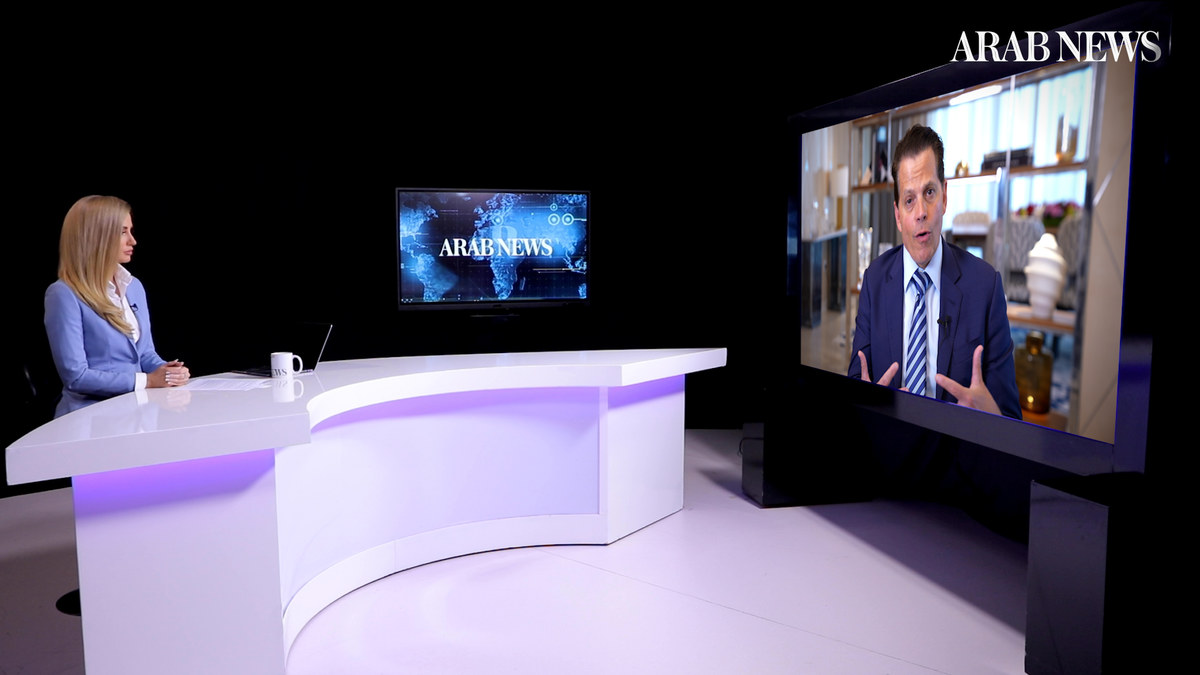DUBAI: The American financier and entrepreneur Anthony Scaramucci has reiterated that he considers the US-Saudi relationship a “Catholic marriage” in the latest episode of “Frankly Speaking,” the weekly current-affairs talk show of Arab News that engages with leading policymakers and business leaders.
Reminded that he had described Saudi-US ties as “crucial” in a 2021 interview with Arab News, and asked what advice he would give to President Joe Biden in order to improve the relationship today, he said: “I called it a Catholic marriage. We can fight with each other, but we are staying permanently married. Whatever the interregnum rubs are between the sovereigns, they are temporary. We need each other.”
In the interview from Abu Dhabi, where he was attending the second Investopia conference, Scaramucci touched on a wide range of topics, lauded the economic opportunities in the Gulf region, and confirmed plans to take the SALT thought-leadership forum to Riyadh.
Elaborating on the Saudi-US relationship, he said: “We’ve figured out a way over the last 80 to 90 years to be interwoven. Our economies, our governments, our intelligence communities, our defense departments are very much entwined. So, I would just ask people in the White House, and also in the UAE and in Riyadh, to just think about these things in long periods of time.”
Scaramucci, who briefly served as the White House director of communications in July 2017 when Donald Trump was the US president, added: “We’ve had a tendency in the world lately to … devolve back into tribalism and to devolve back into a little bit of a rub with each other. It’s sort of ‘my way or no way.’ We’ve got to get back to thinking about more of the spirit of the cooperation and recognizing how much better we are together and how much more prosperous we can be. That would be my general recommendation (to the Biden White House).”
As a regular visitor to Saudi Arabia, Scaramucci applauded the Kingdom’s leadership for its policy innovations and reforms.
“As they start to create these reforms and they build more infrastructure, and they move to a zero-carbon emissions standard, and they build these beautiful cities like NEOM, the Kingdom is opening to the rest of the world. It’s a beautiful, hospitable culture in the Kingdom,” he said.
He said Saudi Arabia’s prioritization of its tourism industry has allowed for greater cultural exchange and understanding with the global community.
“I applaud the Kingdom for the reforms (it is) making. And I think the best years for the Kingdom are ahead of itself,” he told Katie Jensen, the host of “Frankly Speaking.”

As a regular visitor to Saudi Arabia, Scaramucci applauded the Kingdom’s leadership for its policy innovations and reforms. (AN Photo)
The way Scaramucci sees it, besides simply diversifying the economy toward sectors such as tourism and away from oil and carbon fuels, the Kingdom’s economic strategy aims to create a positive environment for foreign direct investment.
Since the launch of Saudi Vision 2030 in 2016, Saudi Arabia has taken multiple steps toward encouraging foreign investment, including allowing foreign companies to list on the Saudi Stock Exchange and granting hundreds of international companies license to operate in the Kingdom in 2020.
Asked where Saudi Arabia stood as a destination for foreign direct investment and what his advice would be for it to reach its full potential, Scaramucci said: “If you study the best governments, they have a low taxation strategy, they have an enabling strategy with private enterprise, and then they stick to the rule of law.
“Ultimately, business leaders want to believe if they cut contracts or they buy property, or they make a capital investment in an area of the world, that it’s safe from a property perspective and it’s safe from a legal perspective.
“(Saudi Arabia is) doing that. And that is why capital is going to flow into the country.”
Scaramucci acknowledged that the Federal Reserve rate increases in the US as well as the Ukraine-Russia conflict have been a dampener of the global investment spirit. “There’s a certain sluggishness that’s going on but it’s more macroeconomic-related than industry or region-specific,” he said.
“Once the Fed addresses this inflation problem in the US and lets go of the brakes, if you will, on the economy and we start to see an interest rate pivot … the money will flood into this area because I do believe (the Gulf region) is well-positioned geographically,” Scaramucci said.
“It’s well-positioned in terms of the way the governments are working with the private sector to help enhance innovation. Capital will flow (again), but we have to get through this macroeconomic period right now.”
Only two months in and 2023 is proving to be the year of the conference for the Gulf region. February saw tech giants gather for the LEAP conference in Riyadh; the Investopia x SALT investment event just concluded in the UAE capital; and an international conference is drawing legal luminaries to the Saudi capital to discuss how justice can harness the power of digital change.

As the founder and chairman of SALT, a global networking forum for finance, technology and public policy, Scaramucci is optimistic that conferences of the kind he is associated with could be held in the Gulf region. (AN Photo)
Speaking about his experience at the Investopia conference, which brought together big names such as former US Secretary of State John Kerry, former British Prime Minister Tony Blair and UAE Minister of Economy Abdullah bin Touq, Scaramucci said: “We have a great partnership with the government. Our groups work very well together, and it’s a very interesting hybrid between a … sort of a public entity, a governmental entity, and a private enterprise. The synergies there are quite good. And so, I am hopeful that it will be a long-lasting relationship.”
As the founder and chairman of SALT, a global networking forum for finance, technology and public policy, Scaramucci is optimistic that conferences of the kind he is associated with could be held in the Gulf region.
While he declined to confirm if Investopia x SALT Abu Dhabi was going to be an annual event from now on (“the synergies there are quite good, so I am hopeful that it will be a long-lasting relationship”), he said that were he to take his conference to Riyadh, “they won’t compete with each other.”
Scaramucci said: “They would be separate events, well-spaced in terms of the calendar, and will be (making sure) the flavor of that event (is) more like what the Saudis would like, sort of a Riyadh focus the same way that we do in the UAE.
“It’s very important for us as partners to infuse local elements into the conference. I don’t want to be that Westerner that comes over and sort of arrogantly puts a program together without having a lot of input from the local authorities and from the local idea generation.”
With the Gulf countries playing host to many of the most influential events in the world, several economic figures believe that the road to the future of commerce and investment could pass through the Kingdom. Does Scaramucci too think the future of investment is shifting east toward countries like the UAE and Saudi Arabia?
“I think it is, but it has been over the last three decades. It’s starting to now grow more exponentially as there’s a greater outreach to the international community,” he said.
“I first got to the UAE in 2005. There was a tremendous amount of growth and development, but there’s been exponential growth since then. And so, the next 10 or 15 years here in the region, including Saudi Arabia for that matter, are going to be quite good.”




























